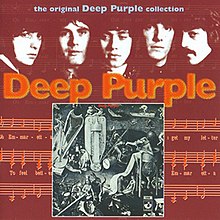Deep Purple (album)
| Deep Purple | ||||
|---|---|---|---|---|
 |
||||
| Studio album by Deep Purple | ||||
| Released | 21 June 1969 (US) September 1969 (UK) |
|||
| Recorded | January–March 1969 | |||
| Studio | De Lane Lea Studios, Kingsway, London | |||
| Genre | Progressive rock, hard rock, psychedelic rock | |||
| Length | 44:34 | |||
| Label |
Tetragrammaton (US) Harvest (UK) Polydor (Canada and Japan) |
|||
| Producer | Derek Lawrence | |||
| Deep Purple chronology | ||||
|
||||
| Remastered re-issue cover | ||||
 |
||||
| Professional ratings | |
|---|---|
| Review scores | |
| Source | Rating |
| AllMusic | |
| PopMatters | |
Deep Purple, also referred to as Deep Purple III, is the third studio album by the English rock band Deep Purple, released in June 1969 on Tetragrammaton Records in the United States and only in September 1969 on Harvest Records in the United Kingdom. Its release was preceded by the single "Emmaretta" and by a long tour in the UK, whose dates were interspersed between the album's recording sessions.
The music of this album is a combination of progressive rock, hard rock and psychedelic rock, but with a harder edge and more evidence given to the guitar parts than in the past. This was due both to the growth of guitarist Ritchie Blackmore as a songwriter and to the conflicts within the band over the fusion of classical music and rock proposed by keyboard player Jon Lord and amply implemented in the band's previous releases.
The band started their second US tour in April and May 1969, with little support from their almost-bankrupt American label and without an album to promote, showing a remarkable progress as performers and a musical direction more oriented towards a heavier and louder sound than before. Doubts about compatibility of vocalist Rod Evans with the hard rock music that other band members wanted to pursue brought to the decision of searching for a substitute, which was found in Ian Gillan of the band Episode Six. Gillan formed a songwriting duo with Episode Six's bassist Roger Glover, who was also invited to join Deep Purple and replaced Nick Simper. The new Mark II line-up debuted live in London on 10 July 1969.
Commercially, this album was the least successful of the three Mark I era albums and was ignored by critics upon its release. Modern reviews are generally positive and remark the variety of styles within the album and the boldness of the song arrangements.
...
Wikipedia
